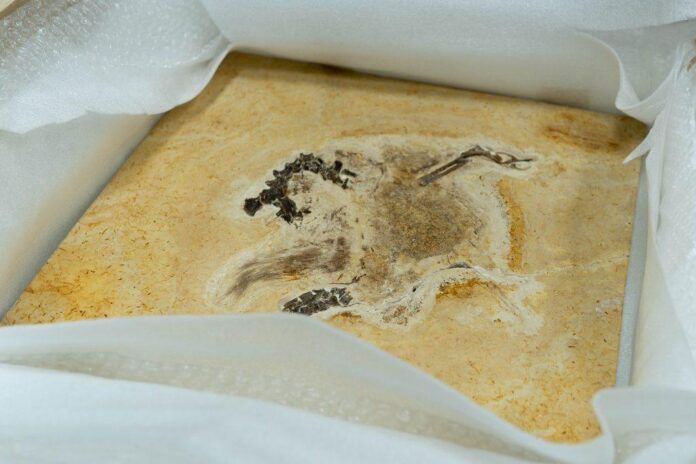A dinosaur fossil that mobilized Brazil’s scientific community has returned home. In a diplomatic ceremony on June 5, Germany’s foreign minister, Annalena Baerbock, met with Brazilian counterparts, and handed over the 120 million-year-old Ubirajara jubatus specimen, one that has been at the center of a long-running paleontological theft scandal.
The specimen was found by researchers in Brazil’s northeastern state of Ceara in 1990 before ending up in the collection of Germany’s State Museum of Natural History Karlsruhe five years later. The dinosaur was at that point unknown and had features that baffled scientists, most notably its covering, which some thought might be algae trapped in the pale-limestone.
In a 2020 paper, an explanation for the dinosaur’s mysterious appearance and a name were provided: the Ubirajara jubatus was a rare non-avian dinosaur with feather-like structures and pointed rods attached to its shoulders, the first of its kind to have been found in the Southern Hemisphere.
Brazil’s scientific community responded strongly to the paper in , claiming the fossil had been lifted illegally from the country and demanding its return. The hashtag #UbirajaraBelongstoBR was soon trending on social media pulling politicians into the fray.

German representatives returned the dinosaur fossil on June 5. Photo: courtesy Ministry of Science, Technology and Innovation.
For their part, the scientists who co-authored the Ubirajara jubatus research claimed the fossil had been transported to the museum after receiving proper authorization from Brazilian officials. This did little to assuage the Brazilian scientists who felt the dinosaur’s provenance was, at best, murky. Although it has been illegal since 1942 to commercially export fossils from the country, a lucrative black market has flourished for years.
A three-year standoff ensued, one finally ended by the arrival of Baerbock in Brasilia.
“I can rest now. I’m finally home!”#UbirajaraBelongsToBR #UbirajaraJubatus #dinosaur #JurassicJune #paleoart pic.twitter.com/OhZnj6fu1g
— André Martins (@kadeauxmartins) June 7, 2023
“We spared no effort to make Ubirajara’s return possible,” Inácio Arruda, the secretary of Brazil’s Science and Technology for Social Development, said in a statement. “Without the mobilization of the Brazilian scientific community, we would not have been successful. The German government was sensitive to our request and, all together, we achieved this victory.”
The dinosaur which scientists believe measured 4.5 feet from snout to tail and weighed about as much as a large chicken will now be shown at the university paleontology museum in Ceara.
More Trending Stories:

























